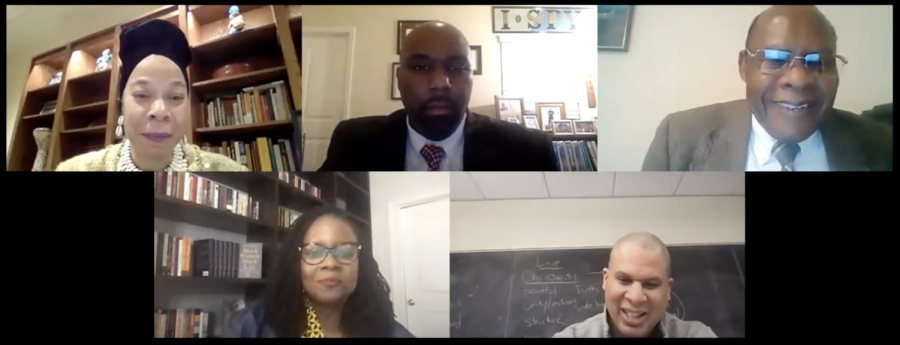Faith and Hope During the Triple Pandemic
The beginning of the spring semester was marked by Colgate’s annual celebration of civil rights leader Rev. Dr. Martin Luther King, Jr. As a part of this celebration, the ALANA Cultural Center hosted a series of speakers, workshops and panel discussions to commemorate the life and continued legacy of Dr. King. On Tuesday, Feb. 2, one of these events included a virtual panel discussion on the triple pandemic – health, politics and social justice. Led and facilitated by Provost and Dean of the Faculty Tracey Hucks ’87, MA ’90, the event featured four panelists: Associate Professor of Religion and African American Studies at Emory University Dianne Stewart ’90, Professor of Philosophy and Religion at Colgate University Harvey Sindima, Associate Professor of Theology at Xavier University Adam Clark ’91 and Pastor of Discipleship and Assimilation at Berean Christian Church and Adjunct Professor of Theology at South University Rev. Dr. Rodney Mason, Jr.
To kickstart the discussion, Sindima shed light on the fact that we are currently living through multiple pandemics. While Covid-19 is a physical threat that has created a global health crisis, there was also a pandemic of racism and injustice ravaging the nation far before the fears surrounding Covid-19 cropped up last spring. In many ways, these pandemics intersect, as statistics show that Covid-19 has disproportionately affected Black Americans. Dr. King also dealt with the pandemic of racism and injustice in the mid-twentieth century when he called for the population to take action. Reflecting on King’s life, Sindima remarked that he believed Dr. King would have responded similarly to the current moment by strongly urging people to take a proactive stance towards combating all pandemics. Dr. King did not only verbally advocate for civil rights, but physically joined the American people in a push for equality. He taught the importance of speaking about the issues at hand, but he emphasized taking action to combat these issues over all else. Sindima encouraged people to follow in Dr. King’s footsteps by refusing to sit idly on the sidelines, and rather choosing to take an active stance in ending the pandemic of racism and injustice.
The discussion continued with remarks from Clark and Stewart. Responding to a question from Hucks, Clark talked about the events that occurred over the summer and how he personally responded to them. He began his response by recognizing two viruses — the Covid-19 virus and the virus of white supremacy. When the events of summer 2020 occurred, Clark led many groups that examined the prophetic dimension of Christian faith and led the call for the defunding of white theology. Continuing with a conversation about religion, Stewart spoke to the importance of having theological literacy. She believes that it is imperative for scholars of religion to help people understand what religious studies is truly about as a critical discourse. In doing so, Stewart thinks people will have more tools to better understand the messages that are displayed in the world.
Before the panel concluded, Mason shared additional thoughts on how faith-based organizations have recently stepped up in ways that have allowed them to connect with their communities during these tough times. In addition to partnering with organizations to help alleviate the burdens that people experience during the Covid-19 pandemic, his church also did a series on Black Lives Matter to address the pandemic of racism and injustice.
As the panel discussion came to a close, participants were invited to attend an alumni and student mixer to further discuss related topics and continue celebrating the life and legacy of Rev. Dr. Martin Luther King, Jr.









